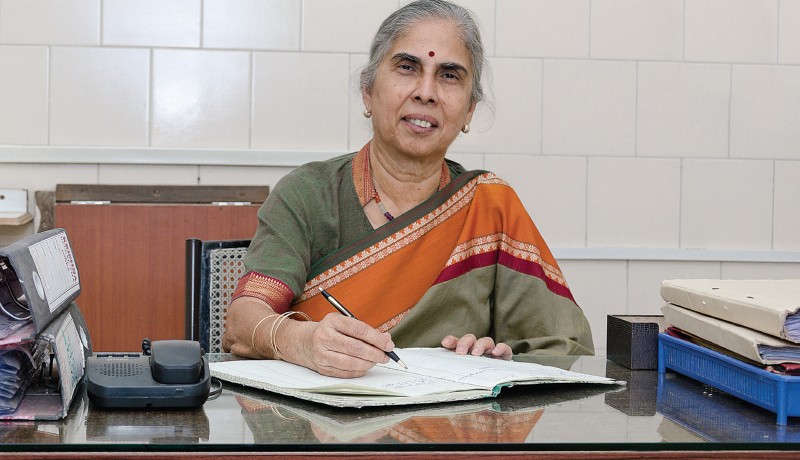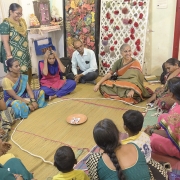
People

Dr Armida Fernandez, 73, Mumbai
Founder of India’s first human milk bank
Everyone has their own imagined version of heaven. Dr Armida Fernandez describes hers as an entire day spent in a lazy chair, book in hand, surrounded by lots of happy dogs, cats and plants. Indeed, such moments of serene repose should not seem all that unattainable to most of us, but Fernandez’ calendar is a breathless chart of work and commitments that rarely leaves much room for simple pleasures.
Fernandez is medical director at Holy Family Hospital; founder of SNEHA, an NGO that works in the areas of maternal and infant health and nutrition, and prevention of violence against women and children in the city’s slums; head of a palliative care centre; pioneer of many low-cost techniques for survival of newborn babies; former dean of one of Mumbai’s busiest municipal hospitals; and retired professor of neonatology. But her crowning achievement still continues to be her path-breaking forays as the founder of Asia’s first human milk bank.
However, if destiny and her own determination hadn’t collaborated in time, Fernandez admits her story would have been a lot different. “I was brought up in Dharwad, where my father was working as a literature professor. He didn’t take me seriously enough at first when I expressed my desire to be a doctor,” she reminisces. “But when I sailed through my medical entrance exams and moved to Mumbai to pursue my MBBS, it finally sunk in that I was determined to pursue my dream.”
It was in the late 1980s, as a paediatrician and neonatologist at Lokmanya Tilak Municipal General Hospital (LTMG; popularly known as Sion Hospital), when Fernandez first decided to explore the growing infant mortalities in the intensive care unit for premature babies. “It was heartbreaking to see so many babies die,” says Fernandez, who also started the neonatology department in the hospital in 1977, only the second in the country at that time. “We were losing 70 per cent of them to diarrhoea and sepsis. I instinctively knew there was something we were not doing right.” Over many days of close scrutiny, she traced the cause of diarrhoea to contamination from formula milk and milk bottles. “Intensive care units for premature babies need to have extremely stringent standards of hygiene and sterilisation to ensure a germ-free cocoon,” Fernandez explains. “We had limited staff to handle the unit, which was already burdened with a huge number of babies. We were delivering over 8,000 babies per year at that that time! Even the smallest compromise on hygiene when nurses rush around rinsing hands in haste or don’t sterilise feeding bottles thoroughly can put premature babies at high risk. So I finally decided to do away with formula milk and feeding bottles, and got mothers to step into the ICU to nurse the babies. There is nothing more healing than a mother’s touch.” Needless to say, the hospital authorities were perplexed at her drastic move. But when mortality rates started dropping, the murmurs were silenced in one sweep, and Fernandez kickstarted her relentless campaign for breastfeeding. Also, not all mothers at the hospital could feed their babies enough milk, so she decided to use milk from other mothers to feed deprived babies. “We persuaded and encouraged mothers to express and donate their milk to other mothers.”
Shortly thereafter, during a fellowship at Oxford, Fernandez observed how hospital authorities in the UK collected, pasteurised and stored human milk to feed newborn babies. “I knew then that this was exactly what we needed in India.” Fortune worked in her favour and she got funding from the Taj Group of Hotels to build India—and Asia’s—first human milk bank at Sion Hospital in 1989. In a short span of time, Fernandez and her team at the hospital got healthy lactating mothers to express surplus milk, which was then pasteurised and saved. With the arrival of HIV detection tests, the mothers were also tested for HIV.
In less than four years, infant mortality at Sion Hospital dropped from 70 per cent to 12 per cent. Seeing the success of her simple yet brilliantly effective idea, she decided to share her practices with poor people living in shanties who desperately needed them. Initially, she conducted field trips in the slums once a week, accompanied by a band of PhD students whom she was teaching neonatology. “We spoke about basic neonatal care, breastfeeding and immunisation, but I also knew I needed to spend more time and effort to make a significant difference.” In 1999, Fernandez set up SNEHA with a handful of passionate neonatologists. Today, SNEHA has 400 employees who work at many of the largest slum settlements all over Mumbai.
“I still remember the day Dr Fernandez returned from the UK and told us, ‘Let’s start a human milk bank’,” says her former student and colleague Dr Jayshree Mondkar, professor and head of neonatalogy and director of the human milk bank at Sion Hospital. “She got started immediately and didn’t stop till she had set it up. She has this amazing quality of seeing things through; she never gives up on her dreams. And every single person in her team is made to feel like they are walking with her towards a collective goal.”
Even today, Fernandez’s job rarely gets done in the 10-hour slot she puts in every day. Calls for counselling, medical advice, problem-solving and troubleshooting follow her home, and keep her busy till it’s time to have dinner with her dermatologist husband Rui. It’s both humbling and heartbreaking to know that she never shut herself in even when her only daughter died of cancer three years ago: “She was such a joyful, spirited person, I would have been insulting her if I had allowed myself to turn bitter and give up what I was meant to do.” It has been more than 50 years since Fernandez has been on her toes, making a difference to the world around her in the best way that she can. “We have one life. It better be worth it.”
- My success story: “I was breaking some of the most traditional practices in intensive care of preterm babies, but someone had to do it. Today, there are 22 milk banks in hospitals across the country. Similarly, we didn’t even know what an NGO exactly entailed when we started SNEHA. We learnt so much on the go. Today, SNEHA works with a population of about 650,000 people, and we have been able to bring maternal mortality down in the areas we work by 68-70 per cent and infant mortality by 26 per cent.”
- Challenges: “People were aghast at the idea of feeding a baby breast milk that didn’t belong to its mother. At such times, I would gently explain that if we have no qualms feeding our babies animal milk, we shouldn’t fret too much over feeding milk that belonged to our own species.”
- Lessons learnt: “Social change is not easy to quantify. You have to keep an open mind, and face up to it when ideas don’t work. Get more heads in to think up how things can be made better.”
- Aspirations, goals and vision: “I have great hopes for the palliative care centre at Holy Family Hospital. It is named after my daughter, who died of cancer.”
- The way forward: “I want to see an institutional change. There needs to be more emphasis on additional community programmes in our medical curriculum. We work closely with medical colleges, so young students approach maternity and childcare with passion and feeling, not just as exams to score in.”
- Awards & achievements: Ashoka Fellowship (2004); Mumbai Obstetrics & Gynaecological Society (MOGS) Dr B N Purandare Outstanding Service Award (2010); Qimpro Platinum Standard in Healthcare (2013)
—Rajashree Balaram
Photos: Haresh Patel Featured in Harmony — Celebrate Age Magazine March 2017
GUTS & GLORY
ON STRIKE!
OH, BABY!
I SPY
MARTIAL LAW
AT THE WHEEL
you may also like to read
-
For the love of Sanskrit
During her 60s, if you had told Sushila A that she would be securing a doctorate in Sanskrit in the….
-
Style sensation
Meet Instagram star Moon Lin Cocking a snook at ageism, this nonagenarian Taiwanese woman is slaying street fashion like….
-
Beauty and her beast
Meet Instagram star Linda Rodin Most beauty and style influencers on Instagram hope to launch their beauty line someday…..
-
Cooking up a storm!
Meet Instagram star Shanthi Ramachandran In today’s web-fuelled world, you can now get recipes for your favourite dishes at….








